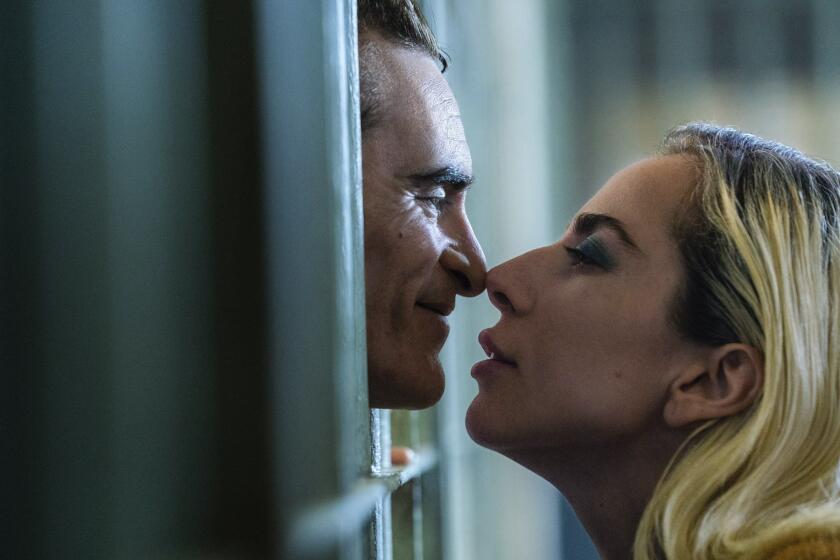Review: ‘Finding Babel’ chronicles a grandson’s search for the legacy of one of the Soviet Union’s greatest writers
Legacy documentaries about history’s gifted writers can sometimes be tough going if the filmmaker hasn’t figured out how to convey the life and the literature on screen in a way that commands your attention without making you just want to quit watching and read the subject’s words yourself.
There are times in David Novack’s documentary “Finding Babel” — about Isaac Babel, the esteemed chronicler of a nascent Soviet Union — when Liev Schreiber’s mellifluous baritone reading excerpts from the writer’s book of war stories, “Red Cavalry,” is both an asset (that prose, that voice) and a taunt (is there a bookstore open?). And yet, paired with impressionistic images of horses or a peasant woman or water or bees – whatever the Odessa-born Babel is describing – the effect of these narrated moments is occasionally that of a highbrow educational film you might see in lit class.
But there’s a more deeply involving structure to Novack’s film than introducing the uninitiated to – or reminding the devotee of – Babel’s convulsively poetic reportage from inside a revolution only beginning. It’s also a travelogue of an elusive artist’s journey, led by his grandson Andrei Malaev-Babel, a Florida-based acting teacher, and marked by emotional stops at places that informed and influenced a man juggling his Jewish, Russian and Soviet identities.
These include the Ukraine – what was then Cossack-ravaged Poland, where Babel was an embedded correspondent – and Paris, which animated his sensual side. His colorful hometown inspired the crime-inflected zest of “Odessa Tales,” while in Moscow a celebrated writer found love (with Malaev-Babel’s grandmother Antonina Pirozhkova, interviewed by the filmmaker a few years before her death) and his fate, as a purge-mad Stalin sent the secret police to arrest Babel in 1939. Forced into a fake confession, one of the century’s greatest writers was executed the following year.
When it’s merely a guided tour marked by sites and talking historians, “Finding Babel” can feel a little color-by-numbers. (Which may explain the Schreiber-read interludes.) But there are excursions that feel invigorating, as when Malaev-Babel enlists actors in Paris to read from his grandfather’s subversive 1935 play “Maria,” their discussions about Babel’s political critiques of a nation turned upside down spliced with snippets of energetic performance. He also sits down with Marina Vlady, star of Jean-Luc Godard’s “2 or 3 Things I Know About Her” and former wife of dissident Soviet poet Vladimir Vysotsky. Asked what truth-tellers like Babel and her husband have in common, she says “They burn faster.”
At a monastery that was once a prison that briefly housed Babel, a priest tells Malaev-Babel that his grandfather’s writings opened his eyes to a regime’s cruelty, but that he also believes, “All of this might return.” Trying to visit the duchy – now in a gated area – where Babel was arrested, his grandson is pushed around by security thugs. Meeting with author Vitaly Shentalinsky, who first viewed Babel’s case file after the security archives opened, the question arises of whether the “disease of evil” that infiltrated Soviet Russia will ever be cured. (In one casually chilling moment in which you can see the past morphing before your eyes, a woman tosses off a remark to Malaev-Babel that at least the Soviets “respected writers.”)
The movie ends on a poignant note, as Malaev-Babel’s grandmother – a noted civil engineer – struggles to describe the painful memory of her husband’s last day with her. But she also testifies to the mix of sadness and humor that made him the writer he was, and who “Finding Babel” honors with intelligence and plenty of feeling.
===
“Finding Babel”
Not rated
Running time: 1 hour, 28 minutes
Playing: Laemmle Town Center 5, Encino
More to Read
Only good movies
Get the Indie Focus newsletter, Mark Olsen's weekly guide to the world of cinema.
You may occasionally receive promotional content from the Los Angeles Times.










